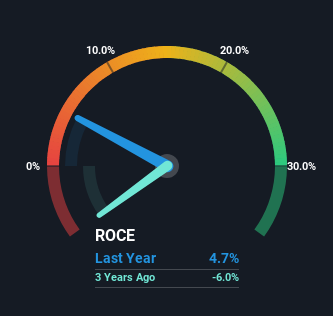We Like These Underlying Return On Capital Trends At Playmaker Capital (CVE:PMKR)

Did you know there are some financial metrics that can provide clues of a potential multi-bagger? In a perfect world, we'd like to see a company investing more capital into its business and ideally the returns earned from that capital are also increasing. Put simply, these types of businesses are compounding machines, meaning they are continually reinvesting their earnings at ever-higher rates of return. Speaking of which, we noticed some great changes in Playmaker Capital's (CVE:PMKR) returns on capital, so let's have a look.
What Is Return On Capital Employed (ROCE)?
For those that aren't sure what ROCE is, it measures the amount of pre-tax profits a company can generate from the capital employed in its business. Analysts use this formula to calculate it for Playmaker Capital:
Return on Capital Employed = Earnings Before Interest and Tax (EBIT) ÷ (Total Assets - Current Liabilities)
0.047 = US$4.4m ÷ (US$120m - US$26m) (Based on the trailing twelve months to June 2023).
Therefore, Playmaker Capital has an ROCE of 4.7%. In absolute terms, that's a low return and it also under-performs the Media industry average of 8.9%.
See our latest analysis for Playmaker Capital

Above you can see how the current ROCE for Playmaker Capital compares to its prior returns on capital, but there's only so much you can tell from the past. If you'd like, you can check out the forecasts from the analysts covering Playmaker Capital here for free.
So How Is Playmaker Capital's ROCE Trending?
The fact that Playmaker Capital is now generating some pre-tax profits from its prior investments is very encouraging. The company was generating losses three years ago, but now it's earning 4.7% which is a sight for sore eyes. Not only that, but the company is utilizing 2,157% more capital than before, but that's to be expected from a company trying to break into profitability. We like this trend, because it tells us the company has profitable reinvestment opportunities available to it, and if it continues going forward that can lead to a multi-bagger performance.
For the record though, there was a noticeable increase in the company's current liabilities over the period, so we would attribute some of the ROCE growth to that. Effectively this means that suppliers or short-term creditors are now funding 22% of the business, which is more than it was three years ago. Keep an eye out for future increases because when the ratio of current liabilities to total assets gets particularly high, this can introduce some new risks for the business.
The Bottom Line On Playmaker Capital's ROCE
To the delight of most shareholders, Playmaker Capital has now broken into profitability. And investors seem to expect more of this going forward, since the stock has rewarded shareholders with a 74% return over the last year. In light of that, we think it's worth looking further into this stock because if Playmaker Capital can keep these trends up, it could have a bright future ahead.
On a separate note, we've found 1 warning sign for Playmaker Capital you'll probably want to know about.
While Playmaker Capital isn't earning the highest return, check out this free list of companies that are earning high returns on equity with solid balance sheets.
New: Manage All Your Stock Portfolios in One Place
We've created the ultimate portfolio companion for stock investors, and it's free.
• Connect an unlimited number of Portfolios and see your total in one currency
• Be alerted to new Warning Signs or Risks via email or mobile
• Track the Fair Value of your stocks
Have feedback on this article? Concerned about the content? Get in touch with us directly. Alternatively, email editorial-team (at) simplywallst.com.
This article by Simply Wall St is general in nature. We provide commentary based on historical data and analyst forecasts only using an unbiased methodology and our articles are not intended to be financial advice. It does not constitute a recommendation to buy or sell any stock, and does not take account of your objectives, or your financial situation. We aim to bring you long-term focused analysis driven by fundamental data. Note that our analysis may not factor in the latest price-sensitive company announcements or qualitative material. Simply Wall St has no position in any stocks mentioned.
About TSXV:PMKR
Playmaker Capital
Playmaker Capital Inc. operates as a digital sports media company that lives at the intersection of sports, betting, media, and technology.
Reasonable growth potential with mediocre balance sheet.
Market Insights
Community Narratives



